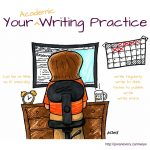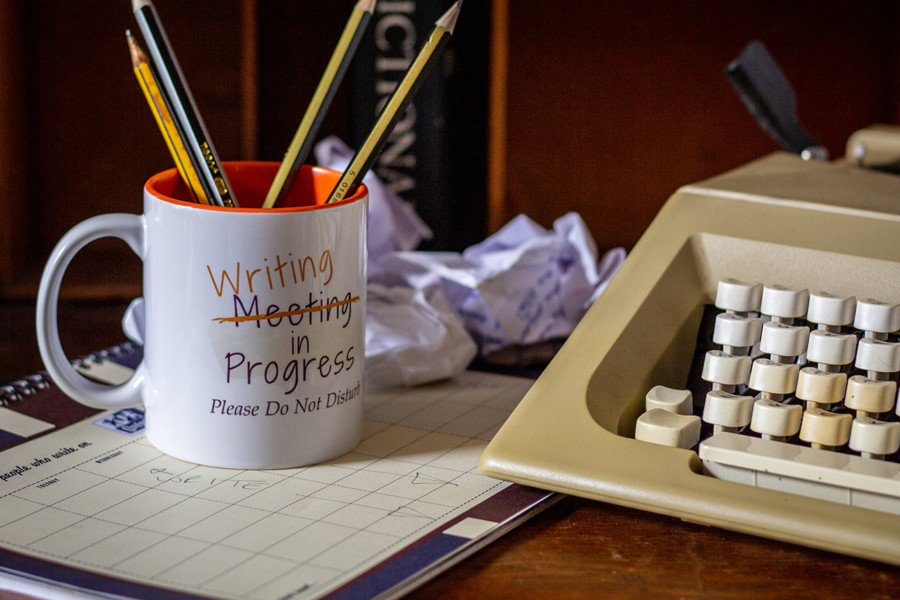The spiral-like nature of your academic life is particularly evident at the beginning of the academic year. No matter how experienced you are, it is always a bit chaotic. It offers the possibility of doing things better, or at least differently, this year. It is easy to approach a new year with your eyes on […]
Read More »Developing a Practice
 Your academic life is more than a string of articles published, classes taught, and meetings attended. You write because this is how you articulate and develop your ideas. You publish to communicate those ideas to others. Posts in this category help you develop the practices you need to do the work you love well without burning out or compromising your values.
Your academic life is more than a string of articles published, classes taught, and meetings attended. You write because this is how you articulate and develop your ideas. You publish to communicate those ideas to others. Posts in this category help you develop the practices you need to do the work you love well without burning out or compromising your values.
You Need a Writing Practice is a good place to start to investigate the Writing subcategory.
Juggling 101: Elements of a good plan is a good place to start investigating the Planning subcategory.
Managing your workload by creating containers
One way to get some control over how much time and energy you give to certain kinds of legitimate requests is to create a container for that kind of work.
Just as it is easier to store flour if you pour it into something with firm sides and a lid (so it doesn’t just flow all over the counter), some tasks can benefit from being contained in particular time periods or particular spaces.
Read More »Decisions take energy
making decisions is one of the most energy-intensive things we do as humans. Making a decision just plain takes a lot of calories. With a complex life, our brains are exhausted most days, too exhausted to make good decisions. Mark Silver A common scenario You have a sense that you should be writing regularly. You […]
Read More »The benefits of working small
Jo VanEvery, Academic Career Guide · The benefits of working small In another post, I asked: “How could you experiment with working in a relaxed state?” — Is working at or just beyond your limits really effective? I proposed that the ways in which my yoga teacher has been encouraging us to work within the comfortable […]
Read More »Is working at or just beyond your limits really effective?
We live in a culture in which we are often demanded to do more. How much writing can you do in a year/semester/week/hour? How many students can you teach effectively? This constant striving for more leaves many of us feeling inadequate a lot of the time. It also privileges an approach to work that is […]
Read More »Thoughts on accountability, deadlines & goals
Jo VanEvery, Academic Career Guide · Thoughts on accountability, deadlines, and goals You want to write more. You want to finish and submit more of your writing. You may think that the only way to do that is to do one or more of the following: set concrete (product-oriented) goals give yourself deadlines for achieving […]
Read More »On valuing your work
Jo VanEvery, Academic Career Guide · On valuing your work I came across a blog post by an artist that resonated with things I know academics also experience. I’d like to share it with you. The post is Artist’s Statement — Part Two at The Pale Rook. In it, the author talks about her own […]
Read More »You don’t need accountability
Jo VanEvery, Academic Career Guide · You don’t need accountability Why do you want an accountability partner/coach/whatever for writing? The things you most dislike about your job, and that you would not do if an external body did not require them, have accountability to that external body built in. You do your grading. You do […]
Read More »“Write all the things” is not a summer plan
Jo VanEvery, Academic Career Guide · Write All The Things! is not a summer plan As the semester got busier, chances are you started saying “I’ll get to that in the summer” about a lot of things, especially writing. At this point you’ve probably got a list that is roughly “Write all the things.” Of […]
Read More »How to take the weekend off
Jo VanEvery, Academic Career Guide · How to take the weekend off Academic life is demanding. During term time you are juggling teaching, administrative and service work, graduate supervision, and your own research and writing. During the summer and your sabbatical, you feel like you need to devote as much time as possible to your […]
Read More »Distraction: not the usual suspects
Jo VanEvery, Academic Career Guide · Distraction: not the usual suspects Distraction is the enemy of productivity. There’s all kinds of time management and productivity advice telling you to track what you are doing and get rid of all the meaningless tasks that don’t contribute to moving your project forward. There are apps and strategies […]
Read More »Fatigue impairs cognitive function
There is lots of research showing that fatigue impairs cognitive function. This is why the military has “boot camp” to make certain behaviours and decisions almost instinctual so they can be done even when fatigued, because war means you sometimes have to work when you are under-functioning cognitively. You are not fighting a war. You […]
Read More »















